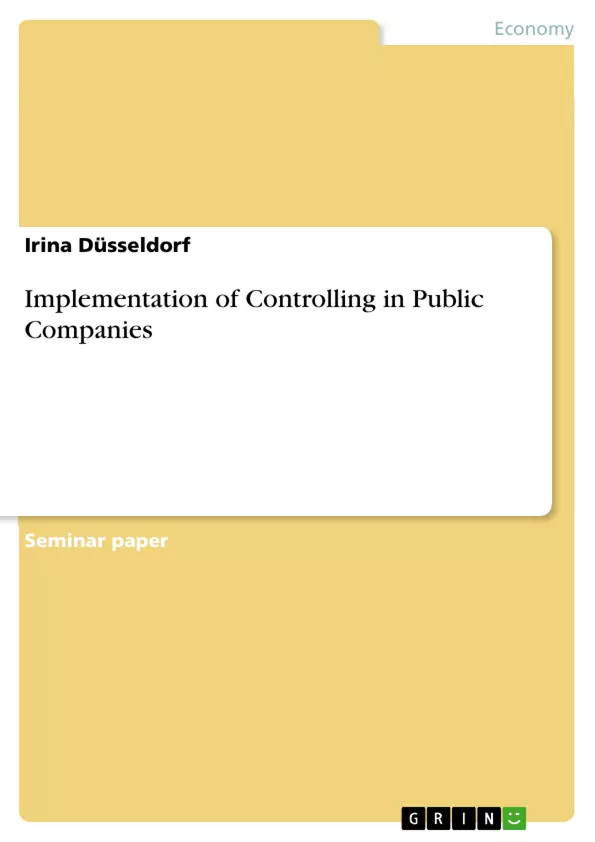A few years ago public companies tried to introduce an output-oriented controlling as well as switching from cameralism to double-entry accounting known from the private sector through innovative management tools. Additionally, private companies tried to establish the cost accounting in the public sector. Through the implementation of these innovative controlling tools public companies expected efficiency enhancement, strong customer focus as well as cost- and timesaving.
The main reason for it was the public finance deficit and the rapid-changing environment as well as the related customer-focused operations and strategies. Especially in cities and municipalities big budget deficits have been observed. Through the changing of social values the individualization of customer needs towards public companies increased. All these changings and deficits couldn’t be solved by a public company without additional external resources. Public companies slowly started to contracting services out and saving on public sector wages. In the same time many public sectors transferred into private ownership of private companies.
A precondition for a successful performance of all these goals is the implementation of a controlling system that defines and measures success factors for companies. This implementation in German public companies still exists only in rudimentary form. Responsible for it is the dislike of control of German politics and public companies.
Inhaltsverzeichnis (Table of Contents)
- Introduction
- Research Question
- Research Method
- Controlling
- Historical Background & Origin
- Two Types of Controlling
- Instruments
- Targets
- Public Companies in Present
- Public Companies
- New Public Management
- Private Public Partnership
- Controlling Implementation in Public Companies
- Process of Implementation
- Targets of Controlling in Public Management
- Instruments
- Conclusion
Zielsetzung und Themenschwerpunkte (Objectives and Key Themes)
This research paper examines the implementation of controlling systems in German public companies. It aims to understand the challenges and opportunities associated with introducing cost accounting and output-oriented controlling in the public sector.
- The historical background and development of controlling in the public sector
- The challenges of implementing controlling in a context of public finance deficits and changing social values
- The specific instruments and targets of controlling in public management
- The role of New Public Management and Private Public Partnerships in shaping controlling practices
- The impact of controlling implementation on the efficiency and effectiveness of public companies
Zusammenfassung der Kapitel (Chapter Summaries)
The first chapter introduces the research question and outlines the methodology employed in the study. It explores the historical context of controlling in the public sector and highlights the growing need for efficiency and effectiveness in public companies.
Chapter two provides a comprehensive overview of the concept of controlling, including its historical development, different types, instruments, and targets. This chapter lays the foundation for understanding how controlling principles apply to the public sector.
Chapter three discusses the current state of public companies in Germany, focusing on the challenges of public finance deficits, changing social values, and the emergence of New Public Management and Private Public Partnerships.
Chapter four delves into the implementation of controlling systems in public companies, examining the process, targets, and instruments involved. It analyzes the specific challenges and opportunities associated with applying controlling principles in a public management context.
Schlüsselwörter (Keywords)
The main keywords and focus topics of this research paper include public companies, controlling, cost accounting, efficiency, effectiveness, New Public Management, Private Public Partnerships, public finance deficits, and social values. The study explores the challenges and opportunities of implementing controlling systems in a context of changing public sector dynamics.
Frequently Asked Questions
What is the primary goal of implementing controlling in public companies?
The primary goals include efficiency enhancement, a stronger focus on customer needs, and achieving significant cost and time savings through innovative management tools.
Why did German public companies move toward double-entry accounting?
Public companies attempted to switch from traditional cameralism to double-entry accounting to adopt successful private-sector practices and better manage public finance deficits.
What are the main challenges facing public companies today?
Key challenges include high budget deficits (especially in municipalities), rapidly changing environments, and an increase in the individualization of customer needs due to changing social values.
What role does New Public Management play in controlling?
New Public Management shapes controlling practices by introducing output-oriented strategies and fostering Private Public Partnerships to improve efficiency.
Why is controlling implementation in German public companies still limited?
Implementation remains in a rudimentary form largely due to a general dislike of control within German politics and the management of public companies.
- Quote paper
- Irina Düsseldorf (Author), 2016, Implementation of Controlling in Public Companies, Munich, GRIN Verlag, https://www.grin.com/document/350010



